-
EXECUTIVE SUMMARY
-
Market Overview
-
Key Findings
-
Market Segmentation
-
Competitive Landscape
-
Challenges and Opportunities
-
Future Outlook
-
MARKET INTRODUCTION
-
Definition
-
Scope of the study
- Research Objective
- Assumption
- Limitations
-
RESEARCH METHODOLOGY
-
Overview
-
Data Mining
-
Secondary Research
-
Primary Research
- Primary Interviews and Information Gathering Process
- Breakdown of Primary Respondents
-
Forecasting Model
-
Market Size Estimation
- Bottom-Up Approach
- Top-Down Approach
-
Data Triangulation
-
Validation
-
MARKET DYNAMICS
-
Overview
-
Drivers
-
Restraints
-
Opportunities
-
MARKET FACTOR ANALYSIS
-
Value chain Analysis
-
Porter's Five Forces Analysis
- Bargaining Power of Suppliers
- Bargaining Power of Buyers
- Threat of New Entrants
- Threat of Substitutes
- Intensity of Rivalry
-
COVID-19 Impact Analysis
- Market Impact Analysis
- Regional Impact
- Opportunity and Threat Analysis
-
AUTOMOTIVE AUTOMATIC TRANSMISSION SYSTEM MARKET, BY TRANSMISSION TYPE (USD BILLION)
-
Automatic
-
Continuously Variable Transmission
-
Dual-Clutch Transmission
-
Semi-Automatic
-
AUTOMOTIVE AUTOMATIC TRANSMISSION SYSTEM MARKET, BY VEHICLE TYPE (USD BILLION)
-
Passenger Cars
-
Commercial Vehicles
-
Electric Vehicles
-
Luxury Vehicles
-
AUTOMOTIVE AUTOMATIC TRANSMISSION SYSTEM MARKET, BY COMPONENT TYPE (USD BILLION)
-
Transmission Control Unit
-
Transmission Fluid
-
Torque Converter
-
Gear Set
-
AUTOMOTIVE AUTOMATIC TRANSMISSION SYSTEM MARKET, BY END USE (USD BILLION)
-
Private Use
-
Fleet Operations
-
Ride-Sharing
-
Public Transportation
-
AUTOMOTIVE AUTOMATIC TRANSMISSION SYSTEM MARKET, BY REGIONAL (USD BILLION)
-
North America
- US
- Canada
-
Europe
- Germany
- UK
- France
- Russia
- Italy
- Spain
- Rest of Europe
-
APAC
- China
- India
- Japan
- South Korea
- Malaysia
- Thailand
- Indonesia
- Rest of APAC
-
South America
- Brazil
- Mexico
- Argentina
- Rest of South America
-
MEA
- GCC Countries
- South Africa
- Rest of MEA
-
COMPETITIVE LANDSCAPE
-
Overview
-
Competitive Analysis
-
Market share Analysis
-
Major Growth Strategy in the Automotive Automatic Transmission System Market
-
Competitive Benchmarking
-
Leading Players in Terms of Number of Developments in the Automotive Automatic Transmission System Market
-
Key developments and growth strategies
- New Product Launch/Service Deployment
- Merger & Acquisitions
- Joint Ventures
-
Major Players Financial Matrix
- Sales and Operating Income
- Major Players R&D Expenditure. 2023
-
COMPANY PROFILES
-
Nissan Motor
- Financial Overview
- Products Offered
- Key Developments
- SWOT Analysis
- Key Strategies
-
Magna International
- Financial Overview
- Products Offered
- Key Developments
- SWOT Analysis
- Key Strategies
-
BMW AG
- Financial Overview
- Products Offered
- Key Developments
- SWOT Analysis
- Key Strategies
-
Jatco
- Financial Overview
- Products Offered
- Key Developments
- SWOT Analysis
- Key Strategies
-
Aisin Seiki
- Financial Overview
- Products Offered
- Key Developments
- SWOT Analysis
- Key Strategies
-
Toyota Motor
- Financial Overview
- Products Offered
- Key Developments
- SWOT Analysis
- Key Strategies
-
Daimler AG
- Financial Overview
- Products Offered
- Key Developments
- SWOT Analysis
- Key Strategies
-
Honda Motor
- Financial Overview
- Products Offered
- Key Developments
- SWOT Analysis
- Key Strategies
-
ZF Friedrichshafen
- Financial Overview
- Products Offered
- Key Developments
- SWOT Analysis
- Key Strategies
-
Delphi Technologies
- Financial Overview
- Products Offered
- Key Developments
- SWOT Analysis
- Key Strategies
-
Eaton Corporation
- Financial Overview
- Products Offered
- Key Developments
- SWOT Analysis
- Key Strategies
-
General Motors
- Financial Overview
- Products Offered
- Key Developments
- SWOT Analysis
- Key Strategies
-
Ford Motor
- Financial Overview
- Products Offered
- Key Developments
- SWOT Analysis
- Key Strategies
-
Hyundai Motor
- Financial Overview
- Products Offered
- Key Developments
- SWOT Analysis
- Key Strategies
-
Volkswagen
- Financial Overview
- Products Offered
- Key Developments
- SWOT Analysis
- Key Strategies
-
APPENDIX
-
References
-
Related Reports LIST OF TABLES
-
TABLE
-
LIST OF ASSUMPTIONS
-
TABLE
-
NORTH AMERICA AUTOMOTIVE AUTOMATIC TRANSMISSION SYSTEM MARKET SIZE ESTIMATES & FORECAST, BY TRANSMISSION TYPE, 2019-2035 (USD BILLIONS)
-
TABLE
-
NORTH AMERICA AUTOMOTIVE AUTOMATIC TRANSMISSION SYSTEM MARKET SIZE ESTIMATES & FORECAST, BY VEHICLE TYPE, 2019-2035 (USD BILLIONS)
-
TABLE
-
NORTH AMERICA AUTOMOTIVE AUTOMATIC TRANSMISSION SYSTEM MARKET SIZE ESTIMATES & FORECAST, BY COMPONENT TYPE, 2019-2035 (USD BILLIONS)
-
TABLE
-
NORTH AMERICA AUTOMOTIVE AUTOMATIC TRANSMISSION SYSTEM MARKET SIZE ESTIMATES & FORECAST, BY END USE, 2019-2035 (USD BILLIONS)
-
TABLE
-
NORTH AMERICA AUTOMOTIVE AUTOMATIC TRANSMISSION SYSTEM MARKET SIZE ESTIMATES & FORECAST, BY REGIONAL, 2019-2035 (USD BILLIONS)
-
TABLE
-
US AUTOMOTIVE AUTOMATIC TRANSMISSION SYSTEM MARKET SIZE ESTIMATES & FORECAST, BY TRANSMISSION TYPE, 2019-2035 (USD BILLIONS)
-
TABLE
-
US AUTOMOTIVE AUTOMATIC TRANSMISSION SYSTEM MARKET SIZE ESTIMATES & FORECAST, BY VEHICLE TYPE, 2019-2035 (USD BILLIONS)
-
TABLE
-
US AUTOMOTIVE AUTOMATIC TRANSMISSION SYSTEM MARKET SIZE ESTIMATES & FORECAST, BY COMPONENT TYPE, 2019-2035 (USD BILLIONS)
-
TABLE
-
US AUTOMOTIVE AUTOMATIC TRANSMISSION SYSTEM MARKET SIZE ESTIMATES & FORECAST, BY END USE, 2019-2035 (USD BILLIONS)
-
TABLE
-
US AUTOMOTIVE AUTOMATIC TRANSMISSION SYSTEM MARKET SIZE ESTIMATES & FORECAST, BY REGIONAL, 2019-2035 (USD BILLIONS)
-
TABLE
-
CANADA AUTOMOTIVE AUTOMATIC TRANSMISSION SYSTEM MARKET SIZE ESTIMATES & FORECAST, BY TRANSMISSION TYPE, 2019-2035 (USD BILLIONS)
-
TABLE
-
CANADA AUTOMOTIVE AUTOMATIC TRANSMISSION SYSTEM MARKET SIZE ESTIMATES & FORECAST, BY VEHICLE TYPE, 2019-2035 (USD BILLIONS)
-
TABLE
-
CANADA AUTOMOTIVE AUTOMATIC TRANSMISSION SYSTEM MARKET SIZE ESTIMATES & FORECAST, BY COMPONENT TYPE, 2019-2035 (USD BILLIONS)
-
TABLE
-
CANADA AUTOMOTIVE AUTOMATIC TRANSMISSION SYSTEM MARKET SIZE ESTIMATES & FORECAST, BY END USE, 2019-2035 (USD BILLIONS)
-
TABLE
-
CANADA AUTOMOTIVE AUTOMATIC TRANSMISSION SYSTEM MARKET SIZE ESTIMATES & FORECAST, BY REGIONAL, 2019-2035 (USD BILLIONS)
-
TABLE
-
EUROPE AUTOMOTIVE AUTOMATIC TRANSMISSION SYSTEM MARKET SIZE ESTIMATES & FORECAST, BY TRANSMISSION TYPE, 2019-2035 (USD BILLIONS)
-
TABLE
-
EUROPE AUTOMOTIVE AUTOMATIC TRANSMISSION SYSTEM MARKET SIZE ESTIMATES & FORECAST, BY VEHICLE TYPE, 2019-2035 (USD BILLIONS)
-
TABLE
-
EUROPE AUTOMOTIVE AUTOMATIC TRANSMISSION SYSTEM MARKET SIZE ESTIMATES & FORECAST, BY COMPONENT TYPE, 2019-2035 (USD BILLIONS)
-
TABLE
-
EUROPE AUTOMOTIVE AUTOMATIC TRANSMISSION SYSTEM MARKET SIZE ESTIMATES & FORECAST, BY END USE, 2019-2035 (USD BILLIONS)
-
TABLE
-
EUROPE AUTOMOTIVE AUTOMATIC TRANSMISSION SYSTEM MARKET SIZE ESTIMATES & FORECAST, BY REGIONAL, 2019-2035 (USD BILLIONS)
-
TABLE
-
GERMANY AUTOMOTIVE AUTOMATIC TRANSMISSION SYSTEM MARKET SIZE ESTIMATES & FORECAST, BY TRANSMISSION TYPE, 2019-2035 (USD BILLIONS)
-
TABLE
-
GERMANY AUTOMOTIVE AUTOMATIC TRANSMISSION SYSTEM MARKET SIZE ESTIMATES & FORECAST, BY VEHICLE TYPE, 2019-2035 (USD BILLIONS)
-
TABLE
-
GERMANY AUTOMOTIVE AUTOMATIC TRANSMISSION SYSTEM MARKET SIZE ESTIMATES & FORECAST, BY COMPONENT TYPE, 2019-2035 (USD BILLIONS)
-
TABLE
-
GERMANY AUTOMOTIVE AUTOMATIC TRANSMISSION SYSTEM MARKET SIZE ESTIMATES & FORECAST, BY END USE, 2019-2035 (USD BILLIONS)
-
TABLE
-
GERMANY AUTOMOTIVE AUTOMATIC TRANSMISSION SYSTEM MARKET SIZE ESTIMATES & FORECAST, BY REGIONAL, 2019-2035 (USD BILLIONS)
-
TABLE
-
UK AUTOMOTIVE AUTOMATIC TRANSMISSION SYSTEM MARKET SIZE ESTIMATES & FORECAST, BY TRANSMISSION TYPE, 2019-2035 (USD BILLIONS)
-
TABLE
-
UK AUTOMOTIVE AUTOMATIC TRANSMISSION SYSTEM MARKET SIZE ESTIMATES & FORECAST, BY VEHICLE TYPE, 2019-2035 (USD BILLIONS)
-
TABLE
-
UK AUTOMOTIVE AUTOMATIC TRANSMISSION SYSTEM MARKET SIZE ESTIMATES & FORECAST, BY COMPONENT TYPE, 2019-2035 (USD BILLIONS)
-
TABLE
-
UK AUTOMOTIVE AUTOMATIC TRANSMISSION SYSTEM MARKET SIZE ESTIMATES & FORECAST, BY END USE, 2019-2035 (USD BILLIONS)
-
TABLE
-
UK AUTOMOTIVE AUTOMATIC TRANSMISSION SYSTEM MARKET SIZE ESTIMATES & FORECAST, BY REGIONAL, 2019-2035 (USD BILLIONS)
-
TABLE
-
FRANCE AUTOMOTIVE AUTOMATIC TRANSMISSION SYSTEM MARKET SIZE ESTIMATES & FORECAST, BY TRANSMISSION TYPE, 2019-2035 (USD BILLIONS)
-
TABLE
-
FRANCE AUTOMOTIVE AUTOMATIC TRANSMISSION SYSTEM MARKET SIZE ESTIMATES & FORECAST, BY VEHICLE TYPE, 2019-2035 (USD BILLIONS)
-
TABLE
-
FRANCE AUTOMOTIVE AUTOMATIC TRANSMISSION SYSTEM MARKET SIZE ESTIMATES & FORECAST, BY COMPONENT TYPE, 2019-2035 (USD BILLIONS)
-
TABLE
-
FRANCE AUTOMOTIVE AUTOMATIC TRANSMISSION SYSTEM MARKET SIZE ESTIMATES & FORECAST, BY END USE, 2019-2035 (USD BILLIONS)
-
TABLE
-
FRANCE AUTOMOTIVE AUTOMATIC TRANSMISSION SYSTEM MARKET SIZE ESTIMATES & FORECAST, BY REGIONAL, 2019-2035 (USD BILLIONS)
-
TABLE
-
RUSSIA AUTOMOTIVE AUTOMATIC TRANSMISSION SYSTEM MARKET SIZE ESTIMATES & FORECAST, BY TRANSMISSION TYPE, 2019-2035 (USD BILLIONS)
-
TABLE
-
RUSSIA AUTOMOTIVE AUTOMATIC TRANSMISSION SYSTEM MARKET SIZE ESTIMATES & FORECAST, BY VEHICLE TYPE, 2019-2035 (USD BILLIONS)
-
TABLE
-
RUSSIA AUTOMOTIVE AUTOMATIC TRANSMISSION SYSTEM MARKET SIZE ESTIMATES & FORECAST, BY COMPONENT TYPE, 2019-2035 (USD BILLIONS)
-
TABLE
-
RUSSIA AUTOMOTIVE AUTOMATIC TRANSMISSION SYSTEM MARKET SIZE ESTIMATES & FORECAST, BY END USE, 2019-2035 (USD BILLIONS)
-
TABLE
-
RUSSIA AUTOMOTIVE AUTOMATIC TRANSMISSION SYSTEM MARKET SIZE ESTIMATES & FORECAST, BY REGIONAL, 2019-2035 (USD BILLIONS)
-
TABLE
-
ITALY AUTOMOTIVE AUTOMATIC TRANSMISSION SYSTEM MARKET SIZE ESTIMATES & FORECAST, BY TRANSMISSION TYPE, 2019-2035 (USD BILLIONS)
-
TABLE
-
ITALY AUTOMOTIVE AUTOMATIC TRANSMISSION SYSTEM MARKET SIZE ESTIMATES & FORECAST, BY VEHICLE TYPE, 2019-2035 (USD BILLIONS)
-
TABLE
-
ITALY AUTOMOTIVE AUTOMATIC TRANSMISSION SYSTEM MARKET SIZE ESTIMATES & FORECAST, BY COMPONENT TYPE, 2019-2035 (USD BILLIONS)
-
TABLE
-
ITALY AUTOMOTIVE AUTOMATIC TRANSMISSION SYSTEM MARKET SIZE ESTIMATES & FORECAST, BY END USE, 2019-2035 (USD BILLIONS)
-
TABLE
-
ITALY AUTOMOTIVE AUTOMATIC TRANSMISSION SYSTEM MARKET SIZE ESTIMATES & FORECAST, BY REGIONAL, 2019-2035 (USD BILLIONS)
-
TABLE
-
SPAIN AUTOMOTIVE AUTOMATIC TRANSMISSION SYSTEM MARKET SIZE ESTIMATES & FORECAST, BY TRANSMISSION TYPE, 2019-2035 (USD BILLIONS)
-
TABLE
-
SPAIN AUTOMOTIVE AUTOMATIC TRANSMISSION SYSTEM MARKET SIZE ESTIMATES & FORECAST, BY VEHICLE TYPE, 2019-2035 (USD BILLIONS)
-
TABLE
-
SPAIN AUTOMOTIVE AUTOMATIC TRANSMISSION SYSTEM MARKET SIZE ESTIMATES & FORECAST, BY COMPONENT TYPE, 2019-2035 (USD BILLIONS)
-
TABLE
-
SPAIN AUTOMOTIVE AUTOMATIC TRANSMISSION SYSTEM MARKET SIZE ESTIMATES & FORECAST, BY END USE, 2019-2035 (USD BILLIONS)
-
TABLE
-
SPAIN AUTOMOTIVE AUTOMATIC TRANSMISSION SYSTEM MARKET SIZE ESTIMATES & FORECAST, BY REGIONAL, 2019-2035 (USD BILLIONS)
-
TABLE
-
REST OF EUROPE AUTOMOTIVE AUTOMATIC TRANSMISSION SYSTEM MARKET SIZE ESTIMATES & FORECAST, BY TRANSMISSION TYPE, 2019-2035 (USD BILLIONS)
-
TABLE
-
REST OF EUROPE AUTOMOTIVE AUTOMATIC TRANSMISSION SYSTEM MARKET SIZE ESTIMATES & FORECAST, BY VEHICLE TYPE, 2019-2035 (USD BILLIONS)
-
TABLE
-
REST OF EUROPE AUTOMOTIVE AUTOMATIC TRANSMISSION SYSTEM MARKET SIZE ESTIMATES & FORECAST, BY COMPONENT TYPE, 2019-2035 (USD BILLIONS)
-
TABLE
-
REST OF EUROPE AUTOMOTIVE AUTOMATIC TRANSMISSION SYSTEM MARKET SIZE ESTIMATES & FORECAST, BY END USE, 2019-2035 (USD BILLIONS)
-
TABLE
-
REST OF EUROPE AUTOMOTIVE AUTOMATIC TRANSMISSION SYSTEM MARKET SIZE ESTIMATES & FORECAST, BY REGIONAL, 2019-2035 (USD BILLIONS)
-
TABLE
-
APAC AUTOMOTIVE AUTOMATIC TRANSMISSION SYSTEM MARKET SIZE ESTIMATES & FORECAST, BY TRANSMISSION TYPE, 2019-2035 (USD BILLIONS)
-
TABLE
-
APAC AUTOMOTIVE AUTOMATIC TRANSMISSION SYSTEM MARKET SIZE ESTIMATES & FORECAST, BY VEHICLE TYPE, 2019-2035 (USD BILLIONS)
-
TABLE
-
APAC AUTOMOTIVE AUTOMATIC TRANSMISSION SYSTEM MARKET SIZE ESTIMATES & FORECAST, BY COMPONENT TYPE, 2019-2035 (USD BILLIONS)
-
TABLE
-
APAC AUTOMOTIVE AUTOMATIC TRANSMISSION SYSTEM MARKET SIZE ESTIMATES & FORECAST, BY END USE, 2019-2035 (USD BILLIONS)
-
TABLE
-
APAC AUTOMOTIVE AUTOMATIC TRANSMISSION SYSTEM MARKET SIZE ESTIMATES & FORECAST, BY REGIONAL, 2019-2035 (USD BILLIONS)
-
TABLE
-
CHINA AUTOMOTIVE AUTOMATIC TRANSMISSION SYSTEM MARKET SIZE ESTIMATES & FORECAST, BY TRANSMISSION TYPE, 2019-2035 (USD BILLIONS)
-
TABLE
-
CHINA AUTOMOTIVE AUTOMATIC TRANSMISSION SYSTEM MARKET SIZE ESTIMATES & FORECAST, BY VEHICLE TYPE, 2019-2035 (USD BILLIONS)
-
TABLE
-
CHINA AUTOMOTIVE AUTOMATIC TRANSMISSION SYSTEM MARKET SIZE ESTIMATES & FORECAST, BY COMPONENT TYPE, 2019-2035 (USD BILLIONS)
-
TABLE
-
CHINA AUTOMOTIVE AUTOMATIC TRANSMISSION SYSTEM MARKET SIZE ESTIMATES & FORECAST, BY END USE, 2019-2035 (USD BILLIONS)
-
TABLE
-
CHINA AUTOMOTIVE AUTOMATIC TRANSMISSION SYSTEM MARKET SIZE ESTIMATES & FORECAST, BY REGIONAL, 2019-2035 (USD BILLIONS)
-
TABLE
-
INDIA AUTOMOTIVE AUTOMATIC TRANSMISSION SYSTEM MARKET SIZE ESTIMATES & FORECAST, BY TRANSMISSION TYPE, 2019-2035 (USD BILLIONS)
-
TABLE
-
INDIA AUTOMOTIVE AUTOMATIC TRANSMISSION SYSTEM MARKET SIZE ESTIMATES & FORECAST, BY VEHICLE TYPE, 2019-2035 (USD BILLIONS)
-
TABLE
-
INDIA AUTOMOTIVE AUTOMATIC TRANSMISSION SYSTEM MARKET SIZE ESTIMATES & FORECAST, BY COMPONENT TYPE, 2019-2035 (USD BILLIONS)
-
TABLE
-
INDIA AUTOMOTIVE AUTOMATIC TRANSMISSION SYSTEM MARKET SIZE ESTIMATES & FORECAST, BY END USE, 2019-2035 (USD BILLIONS)
-
TABLE
-
INDIA AUTOMOTIVE AUTOMATIC TRANSMISSION SYSTEM MARKET SIZE ESTIMATES & FORECAST, BY REGIONAL, 2019-2035 (USD BILLIONS)
-
TABLE
-
JAPAN AUTOMOTIVE AUTOMATIC TRANSMISSION SYSTEM MARKET SIZE ESTIMATES & FORECAST, BY TRANSMISSION TYPE, 2019-2035 (USD BILLIONS)
-
TABLE
-
JAPAN AUTOMOTIVE AUTOMATIC TRANSMISSION SYSTEM MARKET SIZE ESTIMATES & FORECAST, BY VEHICLE TYPE, 2019-2035 (USD BILLIONS)
-
TABLE
-
JAPAN AUTOMOTIVE AUTOMATIC TRANSMISSION SYSTEM MARKET SIZE ESTIMATES & FORECAST, BY COMPONENT TYPE, 2019-2035 (USD BILLIONS)
-
TABLE
-
JAPAN AUTOMOTIVE AUTOMATIC TRANSMISSION SYSTEM MARKET SIZE ESTIMATES & FORECAST, BY END USE, 2019-2035 (USD BILLIONS)
-
TABLE
-
JAPAN AUTOMOTIVE AUTOMATIC TRANSMISSION SYSTEM MARKET SIZE ESTIMATES & FORECAST, BY REGIONAL, 2019-2035 (USD BILLIONS)
-
TABLE
-
SOUTH KOREA AUTOMOTIVE AUTOMATIC TRANSMISSION SYSTEM MARKET SIZE ESTIMATES & FORECAST, BY TRANSMISSION TYPE, 2019-2035 (USD BILLIONS)
-
TABLE
-
SOUTH KOREA AUTOMOTIVE AUTOMATIC TRANSMISSION SYSTEM MARKET SIZE ESTIMATES & FORECAST, BY VEHICLE TYPE, 2019-2035 (USD BILLIONS)
-
TABLE
-
SOUTH KOREA AUTOMOTIVE AUTOMATIC TRANSMISSION SYSTEM MARKET SIZE ESTIMATES & FORECAST, BY COMPONENT TYPE, 2019-2035 (USD BILLIONS)
-
TABLE
-
SOUTH KOREA AUTOMOTIVE AUTOMATIC TRANSMISSION SYSTEM MARKET SIZE ESTIMATES & FORECAST, BY END USE, 2019-2035 (USD BILLIONS)
-
TABLE
-
SOUTH KOREA AUTOMOTIVE AUTOMATIC TRANSMISSION SYSTEM MARKET SIZE ESTIMATES & FORECAST, BY REGIONAL, 2019-2035 (USD BILLIONS)
-
TABLE
-
MALAYSIA AUTOMOTIVE AUTOMATIC TRANSMISSION SYSTEM MARKET SIZE ESTIMATES & FORECAST, BY TRANSMISSION TYPE, 2019-2035 (USD BILLIONS)
-
TABLE
-
MALAYSIA AUTOMOTIVE AUTOMATIC TRANSMISSION SYSTEM MARKET SIZE ESTIMATES & FORECAST, BY VEHICLE TYPE, 2019-2035 (USD BILLIONS)
-
TABLE
-
MALAYSIA AUTOMOTIVE AUTOMATIC TRANSMISSION SYSTEM MARKET SIZE ESTIMATES & FORECAST, BY COMPONENT TYPE, 2019-2035 (USD BILLIONS)
-
TABLE
-
MALAYSIA AUTOMOTIVE AUTOMATIC TRANSMISSION SYSTEM MARKET SIZE ESTIMATES & FORECAST, BY END USE, 2019-2035 (USD BILLIONS)
-
TABLE
-
MALAYSIA AUTOMOTIVE AUTOMATIC TRANSMISSION SYSTEM MARKET SIZE ESTIMATES & FORECAST, BY REGIONAL, 2019-2035 (USD BILLIONS)
-
TABLE
-
THAILAND AUTOMOTIVE AUTOMATIC TRANSMISSION SYSTEM MARKET SIZE ESTIMATES & FORECAST, BY TRANSMISSION TYPE, 2019-2035 (USD BILLIONS)
-
TABLE
-
THAILAND AUTOMOTIVE AUTOMATIC TRANSMISSION SYSTEM MARKET SIZE ESTIMATES & FORECAST, BY VEHICLE TYPE, 2019-2035 (USD BILLIONS)
-
TABLE
-
THAILAND AUTOMOTIVE AUTOMATIC TRANSMISSION SYSTEM MARKET SIZE ESTIMATES & FORECAST, BY COMPONENT TYPE, 2019-2035 (USD BILLIONS)
-
TABLE
-
THAILAND AUTOMOTIVE AUTOMATIC TRANSMISSION SYSTEM MARKET SIZE ESTIMATES & FORECAST, BY END USE, 2019-2035 (USD BILLIONS)
-
TABLE
-
THAILAND AUTOMOTIVE AUTOMATIC TRANSMISSION SYSTEM MARKET SIZE ESTIMATES & FORECAST, BY REGIONAL, 2019-2035 (USD BILLIONS)
-
TABLE
-
INDONESIA AUTOMOTIVE AUTOMATIC TRANSMISSION SYSTEM MARKET SIZE ESTIMATES & FORECAST, BY TRANSMISSION TYPE, 2019-2035 (USD BILLIONS)
-
TABLE
-
INDONESIA AUTOMOTIVE AUTOMATIC TRANSMISSION SYSTEM MARKET SIZE ESTIMATES & FORECAST, BY VEHICLE TYPE, 2019-2035 (USD BILLIONS)
-
TABLE
-
INDONESIA AUTOMOTIVE AUTOMATIC TRANSMISSION SYSTEM MARKET SIZE ESTIMATES & FORECAST, BY COMPONENT TYPE, 2019-2035 (USD BILLIONS)
-
TABLE
-
INDONESIA AUTOMOTIVE AUTOMATIC TRANSMISSION SYSTEM MARKET SIZE ESTIMATES & FORECAST, BY END USE, 2019-2035 (USD BILLIONS)
-
TABLE
-
INDONESIA AUTOMOTIVE AUTOMATIC TRANSMISSION SYSTEM MARKET SIZE ESTIMATES & FORECAST, BY REGIONAL, 2019-2035 (USD BILLIONS)
-
TABLE
-
REST OF APAC AUTOMOTIVE AUTOMATIC TRANSMISSION SYSTEM MARKET SIZE ESTIMATES & FORECAST, BY TRANSMISSION TYPE, 2019-2035 (USD BILLIONS)
-
TABLE
-
REST OF APAC AUTOMOTIVE AUTOMATIC TRANSMISSION SYSTEM MARKET SIZE ESTIMATES & FORECAST, BY VEHICLE TYPE, 2019-2035 (USD BILLIONS)
-
TABLE
-
REST OF APAC AUTOMOTIVE AUTOMATIC TRANSMISSION SYSTEM MARKET SIZE ESTIMATES & FORECAST, BY COMPONENT TYPE, 2019-2035 (USD BILLIONS)
-
TABLE
-
REST OF APAC AUTOMOTIVE AUTOMATIC TRANSMISSION SYSTEM MARKET SIZE ESTIMATES & FORECAST, BY END USE, 2019-2035 (USD BILLIONS)
-
TABLE
-
REST OF APAC AUTOMOTIVE AUTOMATIC TRANSMISSION SYSTEM MARKET SIZE ESTIMATES & FORECAST, BY REGIONAL, 2019-2035 (USD BILLIONS)
-
TABLE
-
SOUTH AMERICA AUTOMOTIVE AUTOMATIC TRANSMISSION SYSTEM MARKET SIZE ESTIMATES & FORECAST, BY TRANSMISSION TYPE, 2019-2035 (USD BILLIONS)
-
TABLE
-
SOUTH AMERICA AUTOMOTIVE AUTOMATIC TRANSMISSION SYSTEM MARKET SIZE ESTIMATES & FORECAST, BY VEHICLE TYPE, 2019-2035 (USD BILLIONS)
-
TABLE
-
SOUTH AMERICA AUTOMOTIVE AUTOMATIC TRANSMISSION SYSTEM MARKET SIZE ESTIMATES & FORECAST, BY COMPONENT TYPE, 2019-2035 (USD BILLIONS)
-
TABLE
-
SOUTH AMERICA AUTOMOTIVE AUTOMATIC TRANSMISSION SYSTEM MARKET SIZE ESTIMATES & FORECAST, BY END USE, 2019-2035 (USD BILLIONS)
-
TABLE
-
SOUTH AMERICA AUTOMOTIVE AUTOMATIC TRANSMISSION SYSTEM MARKET SIZE ESTIMATES & FORECAST, BY REGIONAL, 2019-2035 (USD BILLIONS)
-
TABLE
-
BRAZIL AUTOMOTIVE AUTOMATIC TRANSMISSION SYSTEM MARKET SIZE ESTIMATES & FORECAST, BY TRANSMISSION TYPE, 2019-2035 (USD BILLIONS)
-
TABLE
-
BRAZIL AUTOMOTIVE AUTOMATIC TRANSMISSION SYSTEM MARKET SIZE ESTIMATES & FORECAST, BY VEHICLE TYPE, 2019-2035 (USD BILLIONS)
-
TABLE
-
BRAZIL AUTOMOTIVE AUTOMATIC TRANSMISSION SYSTEM MARKET SIZE ESTIMATES & FORECAST, BY COMPONENT TYPE, 2019-2035 (USD BILLIONS)
-
TABLE
-
BRAZIL AUTOMOTIVE AUTOMATIC TRANSMISSION SYSTEM MARKET SIZE ESTIMATES & FORECAST, BY END USE, 2019-2035 (USD BILLIONS)
-
TABLE
-
BRAZIL AUTOMOTIVE AUTOMATIC TRANSMISSION SYSTEM MARKET SIZE ESTIMATES & FORECAST, BY REGIONAL, 2019-2035 (USD BILLIONS)
-
TABLE
-
MEXICO AUTOMOTIVE AUTOMATIC TRANSMISSION SYSTEM MARKET SIZE ESTIMATES & FORECAST, BY TRANSMISSION TYPE, 2019-2035 (USD BILLIONS)
-
TABLE
-
MEXICO AUTOMOTIVE AUTOMATIC TRANSMISSION SYSTEM MARKET SIZE ESTIMATES & FORECAST, BY VEHICLE TYPE, 2019-2035 (USD BILLIONS)
-
TABLE
-
MEXICO AUTOMOTIVE AUTOMATIC TRANSMISSION SYSTEM MARKET SIZE ESTIMATES & FORECAST, BY COMPONENT TYPE, 2019-2035 (USD BILLIONS)
-
TABLE
-
MEXICO AUTOMOTIVE AUTOMATIC TRANSMISSION SYSTEM MARKET SIZE ESTIMATES & FORECAST, BY END USE, 2019-2035 (USD BILLIONS)
-
TABLE
-
MEXICO AUTOMOTIVE AUTOMATIC TRANSMISSION SYSTEM MARKET SIZE ESTIMATES & FORECAST, BY REGIONAL, 2019-2035 (USD BILLIONS)
-
TABLE
-
ARGENTINA AUTOMOTIVE AUTOMATIC TRANSMISSION SYSTEM MARKET SIZE ESTIMATES & FORECAST, BY TRANSMISSION TYPE, 2019-2035 (USD BILLIONS)
-
TABLE
-
ARGENTINA AUTOMOTIVE AUTOMATIC TRANSMISSION SYSTEM MARKET SIZE ESTIMATES & FORECAST, BY VEHICLE TYPE, 2019-2035 (USD BILLIONS)
-
TABLE
-
ARGENTINA AUTOMOTIVE AUTOMATIC TRANSMISSION SYSTEM MARKET SIZE ESTIMATES & FORECAST, BY COMPONENT TYPE, 2019-2035 (USD BILLIONS)
-
TABLE
-
ARGENTINA AUTOMOTIVE AUTOMATIC TRANSMISSION SYSTEM MARKET SIZE ESTIMATES & FORECAST, BY END USE, 2019-2035 (USD BILLIONS)
-
TABLE
-
ARGENTINA AUTOMOTIVE AUTOMATIC TRANSMISSION SYSTEM MARKET SIZE ESTIMATES & FORECAST, BY REGIONAL, 2019-2035 (USD BILLIONS)
-
TABLE
-
REST OF SOUTH AMERICA AUTOMOTIVE AUTOMATIC TRANSMISSION SYSTEM MARKET SIZE ESTIMATES & FORECAST, BY TRANSMISSION TYPE, 2019-2035 (USD BILLIONS)
-
TABLE
-
REST OF SOUTH AMERICA AUTOMOTIVE AUTOMATIC TRANSMISSION SYSTEM MARKET SIZE ESTIMATES & FORECAST, BY VEHICLE TYPE, 2019-2035 (USD BILLIONS)
-
TABLE
-
REST OF SOUTH AMERICA AUTOMOTIVE AUTOMATIC TRANSMISSION SYSTEM MARKET SIZE ESTIMATES & FORECAST, BY COMPONENT TYPE, 2019-2035 (USD BILLIONS)
-
TABLE
-
REST OF SOUTH AMERICA AUTOMOTIVE AUTOMATIC TRANSMISSION SYSTEM MARKET SIZE ESTIMATES & FORECAST, BY END USE, 2019-2035 (USD BILLIONS)
-
TABLE
-
REST OF SOUTH AMERICA AUTOMOTIVE AUTOMATIC TRANSMISSION SYSTEM MARKET SIZE ESTIMATES & FORECAST, BY REGIONAL, 2019-2035 (USD BILLIONS)
-
TABLE
-
MEA AUTOMOTIVE AUTOMATIC TRANSMISSION SYSTEM MARKET SIZE ESTIMATES & FORECAST, BY TRANSMISSION TYPE, 2019-2035 (USD BILLIONS)
-
TABLE
-
MEA AUTOMOTIVE AUTOMATIC TRANSMISSION SYSTEM MARKET SIZE ESTIMATES & FORECAST, BY VEHICLE TYPE, 2019-2035 (USD BILLIONS)
-
TABLE
-
MEA AUTOMOTIVE AUTOMATIC TRANSMISSION SYSTEM MARKET SIZE ESTIMATES & FORECAST, BY COMPONENT TYPE, 2019-2035 (USD BILLIONS)
-
TABLE
-
MEA AUTOMOTIVE AUTOMATIC TRANSMISSION SYSTEM MARKET SIZE ESTIMATES & FORECAST, BY END USE, 2019-2035 (USD BILLIONS)
-
TABLE
-
MEA AUTOMOTIVE AUTOMATIC TRANSMISSION SYSTEM MARKET SIZE ESTIMATES & FORECAST, BY REGIONAL, 2019-2035 (USD BILLIONS)
-
TABLE
-
GCC COUNTRIES AUTOMOTIVE AUTOMATIC TRANSMISSION SYSTEM MARKET SIZE ESTIMATES & FORECAST, BY TRANSMISSION TYPE, 2019-2035 (USD BILLIONS)
-
TABLE
-
GCC COUNTRIES AUTOMOTIVE AUTOMATIC TRANSMISSION SYSTEM MARKET SIZE ESTIMATES & FORECAST, BY VEHICLE TYPE, 2019-2035 (USD BILLIONS)
-
TABLE
-
GCC COUNTRIES AUTOMOTIVE AUTOMATIC TRANSMISSION SYSTEM MARKET SIZE ESTIMATES & FORECAST, BY COMPONENT TYPE, 2019-2035 (USD BILLIONS)
-
TABLE
-
GCC COUNTRIES AUTOMOTIVE AUTOMATIC TRANSMISSION SYSTEM MARKET SIZE ESTIMATES & FORECAST, BY END USE, 2019-2035 (USD BILLIONS)
-
TABLE
-
GCC COUNTRIES AUTOMOTIVE AUTOMATIC TRANSMISSION SYSTEM MARKET SIZE ESTIMATES & FORECAST, BY REGIONAL, 2019-2035 (USD BILLIONS)
-
TABLE
-
SOUTH AFRICA AUTOMOTIVE AUTOMATIC TRANSMISSION SYSTEM MARKET SIZE ESTIMATES & FORECAST, BY TRANSMISSION TYPE, 2019-2035 (USD BILLIONS)
-
TABLE
-
SOUTH AFRICA AUTOMOTIVE AUTOMATIC TRANSMISSION SYSTEM MARKET SIZE ESTIMATES & FORECAST, BY VEHICLE TYPE, 2019-2035 (USD BILLIONS)
-
TABLE
-
SOUTH AFRICA AUTOMOTIVE AUTOMATIC TRANSMISSION SYSTEM MARKET SIZE ESTIMATES & FORECAST, BY COMPONENT TYPE, 2019-2035 (USD BILLIONS)
-
TABLE
-
SOUTH AFRICA AUTOMOTIVE AUTOMATIC TRANSMISSION SYSTEM MARKET SIZE ESTIMATES & FORECAST, BY END USE, 2019-2035 (USD BILLIONS)
-
TABLE
-
SOUTH AFRICA AUTOMOTIVE AUTOMATIC TRANSMISSION SYSTEM MARKET SIZE ESTIMATES & FORECAST, BY REGIONAL, 2019-2035 (USD BILLIONS)
-
TABLE
-
REST OF MEA AUTOMOTIVE AUTOMATIC TRANSMISSION SYSTEM MARKET SIZE ESTIMATES & FORECAST, BY TRANSMISSION TYPE, 2019-2035 (USD BILLIONS)
-
TABLE
-
REST OF MEA AUTOMOTIVE AUTOMATIC TRANSMISSION SYSTEM MARKET SIZE ESTIMATES & FORECAST, BY VEHICLE TYPE, 2019-2035 (USD BILLIONS)
-
TABLE
-
REST OF MEA AUTOMOTIVE AUTOMATIC TRANSMISSION SYSTEM MARKET SIZE ESTIMATES & FORECAST, BY COMPONENT TYPE, 2019-2035 (USD BILLIONS)
-
TABLE
-
REST OF MEA AUTOMOTIVE AUTOMATIC TRANSMISSION SYSTEM MARKET SIZE ESTIMATES & FORECAST, BY END USE, 2019-2035 (USD BILLIONS)
-
TABLE
-
REST OF MEA AUTOMOTIVE AUTOMATIC TRANSMISSION SYSTEM MARKET SIZE ESTIMATES & FORECAST, BY REGIONAL, 2019-2035 (USD BILLIONS)
-
TABLE
-
PRODUCT LAUNCH/PRODUCT DEVELOPMENT/APPROVAL
-
TABLE
-
ACQUISITION/PARTNERSHIP LIST OF FIGURES
-
FIGURE
-
MARKET SYNOPSIS
-
FIGURE
-
NORTH AMERICA AUTOMOTIVE AUTOMATIC TRANSMISSION SYSTEM MARKET ANALYSIS
-
FIGURE
-
US AUTOMOTIVE AUTOMATIC TRANSMISSION SYSTEM MARKET ANALYSIS BY TRANSMISSION TYPE
-
FIGURE
-
US AUTOMOTIVE AUTOMATIC TRANSMISSION SYSTEM MARKET ANALYSIS BY VEHICLE TYPE
-
FIGURE
-
US AUTOMOTIVE AUTOMATIC TRANSMISSION SYSTEM MARKET ANALYSIS BY COMPONENT TYPE
-
FIGURE
-
US AUTOMOTIVE AUTOMATIC TRANSMISSION SYSTEM MARKET ANALYSIS BY END USE
-
FIGURE
-
US AUTOMOTIVE AUTOMATIC TRANSMISSION SYSTEM MARKET ANALYSIS BY REGIONAL
-
FIGURE
-
CANADA AUTOMOTIVE AUTOMATIC TRANSMISSION SYSTEM MARKET ANALYSIS BY TRANSMISSION TYPE
-
FIGURE
-
CANADA AUTOMOTIVE AUTOMATIC TRANSMISSION SYSTEM MARKET ANALYSIS BY VEHICLE TYPE
-
FIGURE
-
CANADA AUTOMOTIVE AUTOMATIC TRANSMISSION SYSTEM MARKET ANALYSIS BY COMPONENT TYPE
-
FIGURE
-
CANADA AUTOMOTIVE AUTOMATIC TRANSMISSION SYSTEM MARKET ANALYSIS BY END USE
-
FIGURE
-
CANADA AUTOMOTIVE AUTOMATIC TRANSMISSION SYSTEM MARKET ANALYSIS BY REGIONAL
-
FIGURE
-
EUROPE AUTOMOTIVE AUTOMATIC TRANSMISSION SYSTEM MARKET ANALYSIS
-
FIGURE
-
GERMANY AUTOMOTIVE AUTOMATIC TRANSMISSION SYSTEM MARKET ANALYSIS BY TRANSMISSION TYPE
-
FIGURE
-
GERMANY AUTOMOTIVE AUTOMATIC TRANSMISSION SYSTEM MARKET ANALYSIS BY VEHICLE TYPE
-
FIGURE
-
GERMANY AUTOMOTIVE AUTOMATIC TRANSMISSION SYSTEM MARKET ANALYSIS BY COMPONENT TYPE
-
FIGURE
-
GERMANY AUTOMOTIVE AUTOMATIC TRANSMISSION SYSTEM MARKET ANALYSIS BY END USE
-
FIGURE
-
GERMANY AUTOMOTIVE AUTOMATIC TRANSMISSION SYSTEM MARKET ANALYSIS BY REGIONAL
-
FIGURE
-
UK AUTOMOTIVE AUTOMATIC TRANSMISSION SYSTEM MARKET ANALYSIS BY TRANSMISSION TYPE
-
FIGURE
-
UK AUTOMOTIVE AUTOMATIC TRANSMISSION SYSTEM MARKET ANALYSIS BY VEHICLE TYPE
-
FIGURE
-
UK AUTOMOTIVE AUTOMATIC TRANSMISSION SYSTEM MARKET ANALYSIS BY COMPONENT TYPE
-
FIGURE
-
UK AUTOMOTIVE AUTOMATIC TRANSMISSION SYSTEM MARKET ANALYSIS BY END USE
-
FIGURE
-
UK AUTOMOTIVE AUTOMATIC TRANSMISSION SYSTEM MARKET ANALYSIS BY REGIONAL
-
FIGURE
-
FRANCE AUTOMOTIVE AUTOMATIC TRANSMISSION SYSTEM MARKET ANALYSIS BY TRANSMISSION TYPE
-
FIGURE
-
FRANCE AUTOMOTIVE AUTOMATIC TRANSMISSION SYSTEM MARKET ANALYSIS BY VEHICLE TYPE
-
FIGURE
-
FRANCE AUTOMOTIVE AUTOMATIC TRANSMISSION SYSTEM MARKET ANALYSIS BY COMPONENT TYPE
-
FIGURE
-
FRANCE AUTOMOTIVE AUTOMATIC TRANSMISSION SYSTEM MARKET ANALYSIS BY END USE
-
FIGURE
-
FRANCE AUTOMOTIVE AUTOMATIC TRANSMISSION SYSTEM MARKET ANALYSIS BY REGIONAL
-
FIGURE
-
RUSSIA AUTOMOTIVE AUTOMATIC TRANSMISSION SYSTEM MARKET ANALYSIS BY TRANSMISSION TYPE
-
FIGURE
-
RUSSIA AUTOMOTIVE AUTOMATIC TRANSMISSION SYSTEM MARKET ANALYSIS BY VEHICLE TYPE
-
FIGURE
-
RUSSIA AUTOMOTIVE AUTOMATIC TRANSMISSION SYSTEM MARKET ANALYSIS BY COMPONENT TYPE
-
FIGURE
-
RUSSIA AUTOMOTIVE AUTOMATIC TRANSMISSION SYSTEM MARKET ANALYSIS BY END USE
-
FIGURE
-
RUSSIA AUTOMOTIVE AUTOMATIC TRANSMISSION SYSTEM MARKET ANALYSIS BY REGIONAL
-
FIGURE
-
ITALY AUTOMOTIVE AUTOMATIC TRANSMISSION SYSTEM MARKET ANALYSIS BY TRANSMISSION TYPE
-
FIGURE
-
ITALY AUTOMOTIVE AUTOMATIC TRANSMISSION SYSTEM MARKET ANALYSIS BY VEHICLE TYPE
-
FIGURE
-
ITALY AUTOMOTIVE AUTOMATIC TRANSMISSION SYSTEM MARKET ANALYSIS BY COMPONENT TYPE
-
FIGURE
-
ITALY AUTOMOTIVE AUTOMATIC TRANSMISSION SYSTEM MARKET ANALYSIS BY END USE
-
FIGURE
-
ITALY AUTOMOTIVE AUTOMATIC TRANSMISSION SYSTEM MARKET ANALYSIS BY REGIONAL
-
FIGURE
-
SPAIN AUTOMOTIVE AUTOMATIC TRANSMISSION SYSTEM MARKET ANALYSIS BY TRANSMISSION TYPE
-
FIGURE
-
SPAIN AUTOMOTIVE AUTOMATIC TRANSMISSION SYSTEM MARKET ANALYSIS BY VEHICLE TYPE
-
FIGURE
-
SPAIN AUTOMOTIVE AUTOMATIC TRANSMISSION SYSTEM MARKET ANALYSIS BY COMPONENT TYPE
-
FIGURE
-
SPAIN AUTOMOTIVE AUTOMATIC TRANSMISSION SYSTEM MARKET ANALYSIS BY END USE
-
FIGURE
-
SPAIN AUTOMOTIVE AUTOMATIC TRANSMISSION SYSTEM MARKET ANALYSIS BY REGIONAL
-
FIGURE
-
REST OF EUROPE AUTOMOTIVE AUTOMATIC TRANSMISSION SYSTEM MARKET ANALYSIS BY TRANSMISSION TYPE
-
FIGURE
-
REST OF EUROPE AUTOMOTIVE AUTOMATIC TRANSMISSION SYSTEM MARKET ANALYSIS BY VEHICLE TYPE
-
FIGURE
-
REST OF EUROPE AUTOMOTIVE AUTOMATIC TRANSMISSION SYSTEM MARKET ANALYSIS BY COMPONENT TYPE
-
FIGURE
-
REST OF EUROPE AUTOMOTIVE AUTOMATIC TRANSMISSION SYSTEM MARKET ANALYSIS BY END USE
-
FIGURE
-
REST OF EUROPE AUTOMOTIVE AUTOMATIC TRANSMISSION SYSTEM MARKET ANALYSIS BY REGIONAL
-
FIGURE
-
APAC AUTOMOTIVE AUTOMATIC TRANSMISSION SYSTEM MARKET ANALYSIS
-
FIGURE
-
CHINA AUTOMOTIVE AUTOMATIC TRANSMISSION SYSTEM MARKET ANALYSIS BY TRANSMISSION TYPE
-
FIGURE
-
CHINA AUTOMOTIVE AUTOMATIC TRANSMISSION SYSTEM MARKET ANALYSIS BY VEHICLE TYPE
-
FIGURE
-
CHINA AUTOMOTIVE AUTOMATIC TRANSMISSION SYSTEM MARKET ANALYSIS BY COMPONENT TYPE
-
FIGURE
-
CHINA AUTOMOTIVE AUTOMATIC TRANSMISSION SYSTEM MARKET ANALYSIS BY END USE
-
FIGURE
-
CHINA AUTOMOTIVE AUTOMATIC TRANSMISSION SYSTEM MARKET ANALYSIS BY REGIONAL
-
FIGURE
-
INDIA AUTOMOTIVE AUTOMATIC TRANSMISSION SYSTEM MARKET ANALYSIS BY TRANSMISSION TYPE
-
FIGURE
-
INDIA AUTOMOTIVE AUTOMATIC TRANSMISSION SYSTEM MARKET ANALYSIS BY VEHICLE TYPE
-
FIGURE
-
INDIA AUTOMOTIVE AUTOMATIC TRANSMISSION SYSTEM MARKET ANALYSIS BY COMPONENT TYPE
-
FIGURE
-
INDIA AUTOMOTIVE AUTOMATIC TRANSMISSION SYSTEM MARKET ANALYSIS BY END USE
-
FIGURE
-
INDIA AUTOMOTIVE AUTOMATIC TRANSMISSION SYSTEM MARKET ANALYSIS BY REGIONAL
-
FIGURE
-
JAPAN AUTOMOTIVE AUTOMATIC TRANSMISSION SYSTEM MARKET ANALYSIS BY TRANSMISSION TYPE
-
FIGURE
-
JAPAN AUTOMOTIVE AUTOMATIC TRANSMISSION SYSTEM MARKET ANALYSIS BY VEHICLE TYPE
-
FIGURE
-
JAPAN AUTOMOTIVE AUTOMATIC TRANSMISSION SYSTEM MARKET ANALYSIS BY COMPONENT TYPE
-
FIGURE
-
JAPAN AUTOMOTIVE AUTOMATIC TRANSMISSION SYSTEM MARKET ANALYSIS BY END USE
-
FIGURE
-
JAPAN AUTOMOTIVE AUTOMATIC TRANSMISSION SYSTEM MARKET ANALYSIS BY REGIONAL
-
FIGURE
-
SOUTH KOREA AUTOMOTIVE AUTOMATIC TRANSMISSION SYSTEM MARKET ANALYSIS BY TRANSMISSION TYPE
-
FIGURE
-
SOUTH KOREA AUTOMOTIVE AUTOMATIC TRANSMISSION SYSTEM MARKET ANALYSIS BY VEHICLE TYPE
-
FIGURE
-
SOUTH KOREA AUTOMOTIVE AUTOMATIC TRANSMISSION SYSTEM MARKET ANALYSIS BY COMPONENT TYPE
-
FIGURE
-
SOUTH KOREA AUTOMOTIVE AUTOMATIC TRANSMISSION SYSTEM MARKET ANALYSIS BY END USE
-
FIGURE
-
SOUTH KOREA AUTOMOTIVE AUTOMATIC TRANSMISSION SYSTEM MARKET ANALYSIS BY REGIONAL
-
FIGURE
-
MALAYSIA AUTOMOTIVE AUTOMATIC TRANSMISSION SYSTEM MARKET ANALYSIS BY TRANSMISSION TYPE
-
FIGURE
-
MALAYSIA AUTOMOTIVE AUTOMATIC TRANSMISSION SYSTEM MARKET ANALYSIS BY VEHICLE TYPE
-
FIGURE
-
MALAYSIA AUTOMOTIVE AUTOMATIC TRANSMISSION SYSTEM MARKET ANALYSIS BY COMPONENT TYPE
-
FIGURE
-
MALAYSIA AUTOMOTIVE AUTOMATIC TRANSMISSION SYSTEM MARKET ANALYSIS BY END USE
-
FIGURE
-
MALAYSIA AUTOMOTIVE AUTOMATIC TRANSMISSION SYSTEM MARKET ANALYSIS BY REGIONAL
-
FIGURE
-
THAILAND AUTOMOTIVE AUTOMATIC TRANSMISSION SYSTEM MARKET ANALYSIS BY TRANSMISSION TYPE
-
FIGURE
-
THAILAND AUTOMOTIVE AUTOMATIC TRANSMISSION SYSTEM MARKET ANALYSIS BY VEHICLE TYPE
-
FIGURE
-
THAILAND AUTOMOTIVE AUTOMATIC TRANSMISSION SYSTEM MARKET ANALYSIS BY COMPONENT TYPE
-
FIGURE
-
THAILAND AUTOMOTIVE AUTOMATIC TRANSMISSION SYSTEM MARKET ANALYSIS BY END USE
-
FIGURE
-
THAILAND AUTOMOTIVE AUTOMATIC TRANSMISSION SYSTEM MARKET ANALYSIS BY REGIONAL
-
FIGURE
-
INDONESIA AUTOMOTIVE AUTOMATIC TRANSMISSION SYSTEM MARKET ANALYSIS BY TRANSMISSION TYPE
-
FIGURE
-
INDONESIA AUTOMOTIVE AUTOMATIC TRANSMISSION SYSTEM MARKET ANALYSIS BY VEHICLE TYPE
-
FIGURE
-
INDONESIA AUTOMOTIVE AUTOMATIC TRANSMISSION SYSTEM MARKET ANALYSIS BY COMPONENT TYPE
-
FIGURE
-
INDONESIA AUTOMOTIVE AUTOMATIC TRANSMISSION SYSTEM MARKET ANALYSIS BY END USE
-
FIGURE
-
INDONESIA AUTOMOTIVE AUTOMATIC TRANSMISSION SYSTEM MARKET ANALYSIS BY REGIONAL
-
FIGURE
-
REST OF APAC AUTOMOTIVE AUTOMATIC TRANSMISSION SYSTEM MARKET ANALYSIS BY TRANSMISSION TYPE
-
FIGURE
-
REST OF APAC AUTOMOTIVE AUTOMATIC TRANSMISSION SYSTEM MARKET ANALYSIS BY VEHICLE TYPE
-
FIGURE
-
REST OF APAC AUTOMOTIVE AUTOMATIC TRANSMISSION SYSTEM MARKET ANALYSIS BY COMPONENT TYPE
-
FIGURE
-
REST OF APAC AUTOMOTIVE AUTOMATIC TRANSMISSION SYSTEM MARKET ANALYSIS BY END USE
-
FIGURE
-
REST OF APAC AUTOMOTIVE AUTOMATIC TRANSMISSION SYSTEM MARKET ANALYSIS BY REGIONAL
-
FIGURE
-
SOUTH AMERICA AUTOMOTIVE AUTOMATIC TRANSMISSION SYSTEM MARKET ANALYSIS
-
FIGURE
-
BRAZIL AUTOMOTIVE AUTOMATIC TRANSMISSION SYSTEM MARKET ANALYSIS BY TRANSMISSION TYPE
-
FIGURE
-
BRAZIL AUTOMOTIVE AUTOMATIC TRANSMISSION SYSTEM MARKET ANALYSIS BY VEHICLE TYPE
-
FIGURE
-
BRAZIL AUTOMOTIVE AUTOMATIC TRANSMISSION SYSTEM MARKET ANALYSIS BY COMPONENT TYPE
-
FIGURE
-
BRAZIL AUTOMOTIVE AUTOMATIC TRANSMISSION SYSTEM MARKET ANALYSIS BY END USE
-
FIGURE
-
BRAZIL AUTOMOTIVE AUTOMATIC TRANSMISSION SYSTEM MARKET ANALYSIS BY REGIONAL
-
FIGURE
-
MEXICO AUTOMOTIVE AUTOMATIC TRANSMISSION SYSTEM MARKET ANALYSIS BY TRANSMISSION TYPE
-
FIGURE
-
MEXICO AUTOMOTIVE AUTOMATIC TRANSMISSION SYSTEM MARKET ANALYSIS BY VEHICLE TYPE
-
FIGURE
-
MEXICO AUTOMOTIVE AUTOMATIC TRANSMISSION SYSTEM MARKET ANALYSIS BY COMPONENT TYPE
-
FIGURE
-
MEXICO AUTOMOTIVE AUTOMATIC TRANSMISSION SYSTEM MARKET ANALYSIS BY END USE
-
FIGURE
-
MEXICO AUTOMOTIVE AUTOMATIC TRANSMISSION SYSTEM MARKET ANALYSIS BY REGIONAL
-
FIGURE
-
ARGENTINA AUTOMOTIVE AUTOMATIC TRANSMISSION SYSTEM MARKET ANALYSIS BY TRANSMISSION TYPE
-
FIGURE
-
ARGENTINA AUTOMOTIVE AUTOMATIC TRANSMISSION SYSTEM MARKET ANALYSIS BY VEHICLE TYPE
-
FIGURE
-
ARGENTINA AUTOMOTIVE AUTOMATIC TRANSMISSION SYSTEM MARKET ANALYSIS BY COMPONENT TYPE
-
FIGURE
-
ARGENTINA AUTOMOTIVE AUTOMATIC TRANSMISSION SYSTEM MARKET ANALYSIS BY END USE
-
FIGURE
-
ARGENTINA AUTOMOTIVE AUTOMATIC TRANSMISSION SYSTEM MARKET ANALYSIS BY REGIONAL
-
FIGURE
-
REST OF SOUTH AMERICA AUTOMOTIVE AUTOMATIC TRANSMISSION SYSTEM MARKET ANALYSIS BY TRANSMISSION TYPE
-
FIGURE
-
REST OF SOUTH AMERICA AUTOMOTIVE AUTOMATIC TRANSMISSION SYSTEM MARKET ANALYSIS BY VEHICLE TYPE
-
FIGURE
-
REST OF SOUTH AMERICA AUTOMOTIVE AUTOMATIC TRANSMISSION SYSTEM MARKET ANALYSIS BY COMPONENT TYPE
-
FIGURE
-
REST OF SOUTH AMERICA AUTOMOTIVE AUTOMATIC TRANSMISSION SYSTEM MARKET ANALYSIS BY END USE
-
FIGURE
-
REST OF SOUTH AMERICA AUTOMOTIVE AUTOMATIC TRANSMISSION SYSTEM MARKET ANALYSIS BY REGIONAL
-
FIGURE
-
MEA AUTOMOTIVE AUTOMATIC TRANSMISSION SYSTEM MARKET ANALYSIS
-
FIGURE
-
GCC COUNTRIES AUTOMOTIVE AUTOMATIC TRANSMISSION SYSTEM MARKET ANALYSIS BY TRANSMISSION TYPE
-
FIGURE
-
GCC COUNTRIES AUTOMOTIVE AUTOMATIC TRANSMISSION SYSTEM MARKET ANALYSIS BY VEHICLE TYPE
-
FIGURE
-
GCC COUNTRIES AUTOMOTIVE AUTOMATIC TRANSMISSION SYSTEM MARKET ANALYSIS BY COMPONENT TYPE
-
FIGURE
-
GCC COUNTRIES AUTOMOTIVE AUTOMATIC TRANSMISSION SYSTEM MARKET ANALYSIS BY END USE
-
FIGURE
-
GCC COUNTRIES AUTOMOTIVE AUTOMATIC TRANSMISSION SYSTEM MARKET ANALYSIS BY REGIONAL
-
FIGURE
-
SOUTH AFRICA AUTOMOTIVE AUTOMATIC TRANSMISSION SYSTEM MARKET ANALYSIS BY TRANSMISSION TYPE
-
FIGURE
-
SOUTH AFRICA AUTOMOTIVE AUTOMATIC TRANSMISSION SYSTEM MARKET ANALYSIS BY VEHICLE TYPE
-
FIGURE
-
SOUTH AFRICA AUTOMOTIVE AUTOMATIC TRANSMISSION SYSTEM MARKET ANALYSIS BY COMPONENT TYPE
-
FIGURE
-
SOUTH AFRICA AUTOMOTIVE AUTOMATIC TRANSMISSION SYSTEM MARKET ANALYSIS BY END USE
-
FIGURE
-
SOUTH AFRICA AUTOMOTIVE AUTOMATIC TRANSMISSION SYSTEM MARKET ANALYSIS BY REGIONAL
-
FIGURE
-
REST OF MEA AUTOMOTIVE AUTOMATIC TRANSMISSION SYSTEM MARKET ANALYSIS BY TRANSMISSION TYPE
-
FIGURE
-
REST OF MEA AUTOMOTIVE AUTOMATIC TRANSMISSION SYSTEM MARKET ANALYSIS BY VEHICLE TYPE
-
FIGURE
-
REST OF MEA AUTOMOTIVE AUTOMATIC TRANSMISSION SYSTEM MARKET ANALYSIS BY COMPONENT TYPE
-
FIGURE
-
REST OF MEA AUTOMOTIVE AUTOMATIC TRANSMISSION SYSTEM MARKET ANALYSIS BY END USE
-
FIGURE
-
REST OF MEA AUTOMOTIVE AUTOMATIC TRANSMISSION SYSTEM MARKET ANALYSIS BY REGIONAL
-
FIGURE
-
KEY BUYING CRITERIA OF AUTOMOTIVE AUTOMATIC TRANSMISSION SYSTEM MARKET
-
FIGURE
-
RESEARCH PROCESS OF MRFR
-
FIGURE
-
DRO ANALYSIS OF AUTOMOTIVE AUTOMATIC TRANSMISSION SYSTEM MARKET
-
FIGURE
-
DRIVERS IMPACT ANALYSIS: AUTOMOTIVE AUTOMATIC TRANSMISSION SYSTEM MARKET
-
FIGURE
-
RESTRAINTS IMPACT ANALYSIS: AUTOMOTIVE AUTOMATIC TRANSMISSION SYSTEM MARKET
-
FIGURE
-
SUPPLY / VALUE CHAIN: AUTOMOTIVE AUTOMATIC TRANSMISSION SYSTEM MARKET
-
FIGURE
-
AUTOMOTIVE AUTOMATIC TRANSMISSION SYSTEM MARKET, BY TRANSMISSION TYPE, 2025 (% SHARE)
-
FIGURE
-
AUTOMOTIVE AUTOMATIC TRANSMISSION SYSTEM MARKET, BY TRANSMISSION TYPE, 2019 TO 2035 (USD Billions)
-
FIGURE
-
AUTOMOTIVE AUTOMATIC TRANSMISSION SYSTEM MARKET, BY VEHICLE TYPE, 2025 (% SHARE)
-
FIGURE
-
AUTOMOTIVE AUTOMATIC TRANSMISSION SYSTEM MARKET, BY VEHICLE TYPE, 2019 TO 2035 (USD Billions)
-
FIGURE
-
AUTOMOTIVE AUTOMATIC TRANSMISSION SYSTEM MARKET, BY COMPONENT TYPE, 2025 (% SHARE)
-
FIGURE
-
AUTOMOTIVE AUTOMATIC TRANSMISSION SYSTEM MARKET, BY COMPONENT TYPE, 2019 TO 2035 (USD Billions)
-
FIGURE
-
AUTOMOTIVE AUTOMATIC TRANSMISSION SYSTEM MARKET, BY END USE, 2025 (% SHARE)
-
FIGURE
-
AUTOMOTIVE AUTOMATIC TRANSMISSION SYSTEM MARKET, BY END USE, 2019 TO 2035 (USD Billions)
-
FIGURE
-
AUTOMOTIVE AUTOMATIC TRANSMISSION SYSTEM MARKET, BY REGIONAL, 2025 (% SHARE)
-
FIGURE
-
AUTOMOTIVE AUTOMATIC TRANSMISSION SYSTEM MARKET, BY REGIONAL, 2019 TO 2035 (USD Billions)
-
FIGURE
-
BENCHMARKING OF MAJOR COMPETITORS
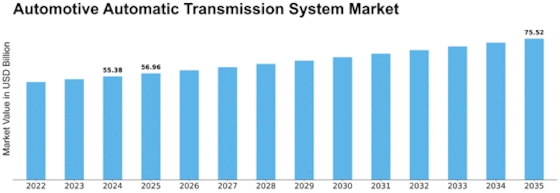


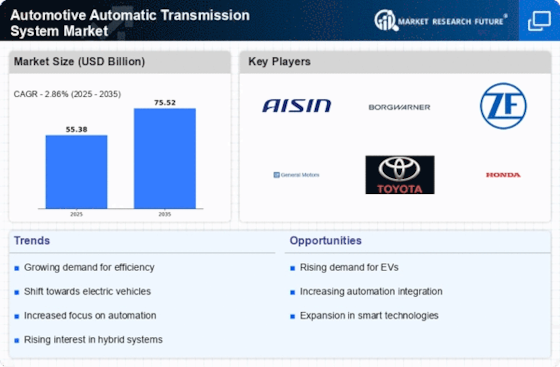
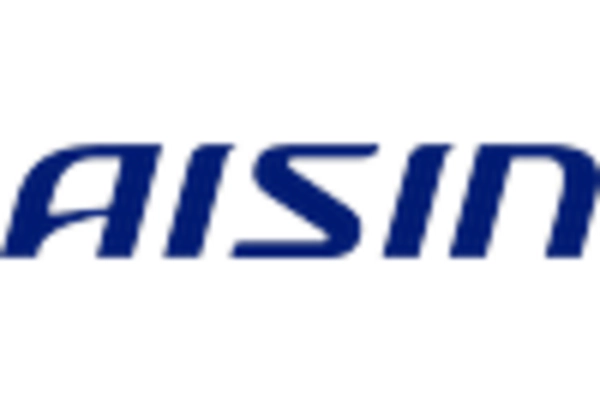
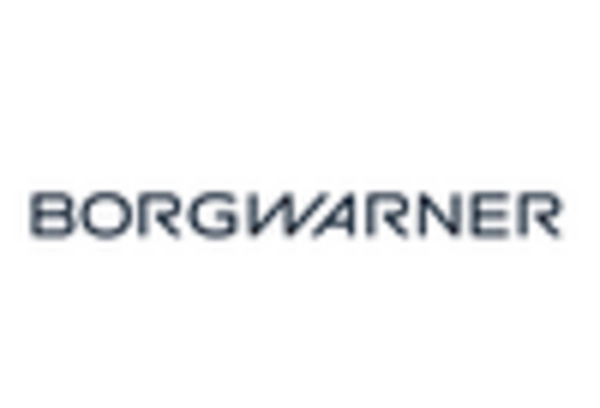



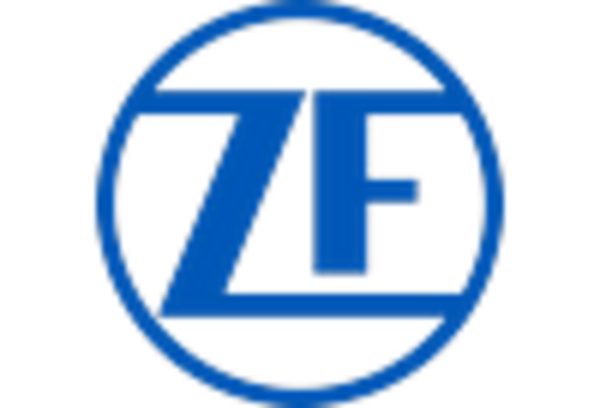









Leave a Comment